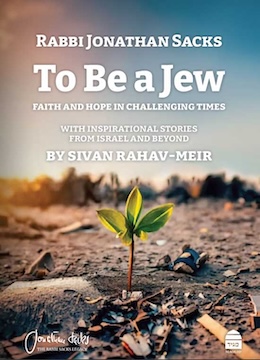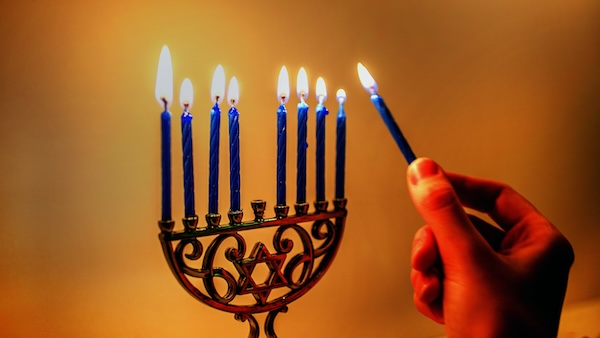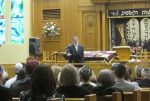“A people driven by hate are not – cannot be – free.” (Rabbi Lord Jonathan Sacks, z”l) (photo from flickr)
According to Exodus 1:8, a new Egyptian king rose to power who did not know Joseph. He did not remember, or did not care, that Joseph, as Egypt’s chief food administrator, had saved the country from famine. As such, this new pharaoh felt no special gratitude toward the Hebrews who had settled in his land so long before. But, while the Torah text deals with pharaoh’s relationship to the Hebrews, it does not address the relationship between the Hebrew slaves and their native Egyptian neighbours.
If we look deeper in the Book of Exodus, we learn that the Hebrew slaves did know the Egyptians – they lived among them. Not only that, but the Hebrews were on good terms with their Egyptian neighbours. Thus, when it was time for the Hebrews to flee from Egypt, their neighbours gave them gifts.
The send-off was carried out in stages. In the first stage, G-d instructs Moses to tell the Hebrews that “each man should ask his neighbour for and each woman of her neighbour, jewels of silver and jewels of gold.” (11:2) It is worth noting that, depending on the context, modern Hebrew might translate neighbour as friend, buddy or colleague. Moreover, the word ask might be translated as borrow – though, since the departing Hebrews had no intention of returning to Egypt, ask is the word to use in this context.
Perhaps G-d was not totally sure how things would work out, so, just to make sure things went as He wanted them to, “He gave the people favour in the eyes of the Egyptians.” This point is apparently so critical that it is repeated soon afterwards: “the Lord gave the people favour in the eyes of the Egyptians that they let the Hebrews have what they asked for.”
Some commentators have said that the Egyptians could not be expected to offer gifts of their own initiative, so the departing Hebrew slaves encouraged them by saying, let us part as friends and we’ll take a parting gift. Others – like Philo in his Life of Moses – observe that the Hebrews were prompted not by love of gain, but by the desire to recoup some of the wages due to them for their slave labour.
The Egyptians, on their part, might have been only too happy to see the Hebrews go, as they were tired of suffering from the increasingly hard-to-take plagues. Thus, in the first chapter of the Book of Exodus, the Hebrews are told to ask for the jewelry and to receive the riches, then they are commanded to “put them on your sons and daughters.”
While it may seem extravagant to gift someone gold and silver, the ancient Egyptians all wore jewelry, it was more commonplace. According to the article “Egyptian Jewelry: A Window into Ancient Culture,” by Morgan Moroney of Johns Hopkins University and the Brooklyn Museum, “From the predynastic through Roman times, jewelry was made, worn, offered, gifted, buried, stolen, appreciated and lost across genders, generations and classes. Egyptians adorned themselves in a variety of embellishments, including rings, earrings, bracelets, pectorals, necklaces, crowns, girdles and amulets. Most Egyptians wore some type of jewelry during their lifetimes.”
That said, gold and silver are important “not only from an economic but also from a symbolic point of view. Gold, for instance, was regarded as a divine and imperishable substance, its untarnishing nature providing a metaphor of eternal life and its brightness an image of the brilliance of the sun…. The very bones of the gods were said to be of silver, just as their flesh was thought to be of gold,” writes Richard H. Wilkinson in his book Symbol & Magic in Egyptian Art.
Taking this point a step further, we might be able to interpret the Egyptians’ giving of silver and gold as an act of bestowing mystical characteristics on the ancient Hebrews. Certainly, it is a recognition that the Egyptian people viewed the Hebrews well.
However, Rabbi Judah, in the name of Samuel, takes a totally different approach. He claimed that the gold and silver had been collected by Joseph when he stored and then sold corn.
Reportedly, the Hebrews took all the gold and silver when they left Egypt and it was eventually taken to the Land of Israel. It remained there until the time of Rehoboam, the son of Solomon, then changed hands many times. It came back to ancient Israel and stayed until Zedekiah. It changed hands between the various conquerors of Israel and eventually was taken by the Romans. It has stayed in Rome ever since.
While the ancient Egyptians seemingly felt comfortable bestowing gold, silver and clothing on the Hebrews, this act is seen by some as more of a taking than a giving. In 2003, Nabil Hilmy, then dean of the faculty of law at Egypt’s Zagazig University, planned to sue the Jews of the world for the trillions of dollars that he claimed the ancient Hebrews had taken from his country. He theorized: “If we assume that the weight of what was stolen was one ton” and its worth “doubled every 20 years, even if annual interest is only 5% … hence, after 1,000 years, it would be worth 1,125,898,240 million tons.… This is for one stolen ton. The stolen gold is estimated at 300 tons, and it was not stolen for 1,000 years, but for 5,758 years, by the Jewish reckoning. Therefore, the debt is very large.”
That the Egyptians gave the Israelites gifts – willingly or not – is noteworthy. Significantly, in the article “Letting Go,” the late Rabbi Lord Jonathan Sacks notes that Deuteronomy 23:7 tells us that we should not hate Egyptians because you lived as a stranger in their land.
“A people driven by hate are not – cannot be – free,” writes Sacks. “Had the people carried with them a burden of hatred and a desire for revenge, Moses would have taken the Israelites out of Egypt, but he would not have taken Egypt out of the Israelites. They would still be there, bound by chains of anger as restricting as any metal. To be free you have to let go of hate.”
The gifts of gold and silver allowed the former slaves to reach some kind of emotional closure; to feel that a new chapter was beginning; to leave without anger and a sense of humiliation.
Further, Sacks cites 20th-century commentator Benno Jacob, who “translated the word venitzaltem in Exodus 3:22 as ‘you shall save,’ not ‘you shall despoil’ the Egyptians. The gifts they took from their neighbours were intended, Jacob argues, to persuade the Israelites that it was not the Egyptians as a whole, only Pharaoh and the leadership, who were responsible for their enslavement…. They were meant to save the Egyptians from any possible future revenge by Israel.”
This is something to contemplate as we read the Haggadah at our seder this year.
Deborah Rubin Fields is an Israel-based features writer. She is also the author of Take a Peek Inside: A Child’s Guide to Radiology Exams, published in English, Hebrew and Arabic.




